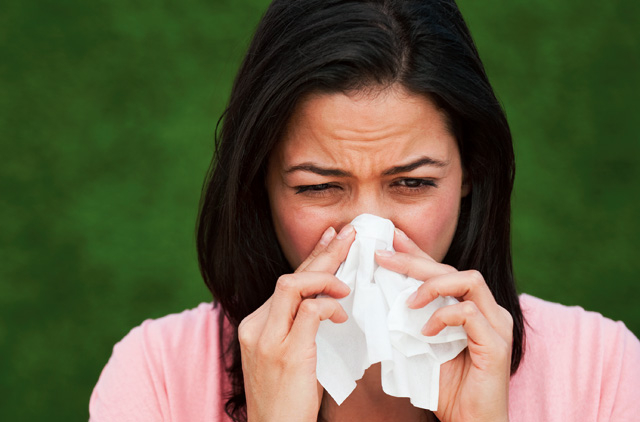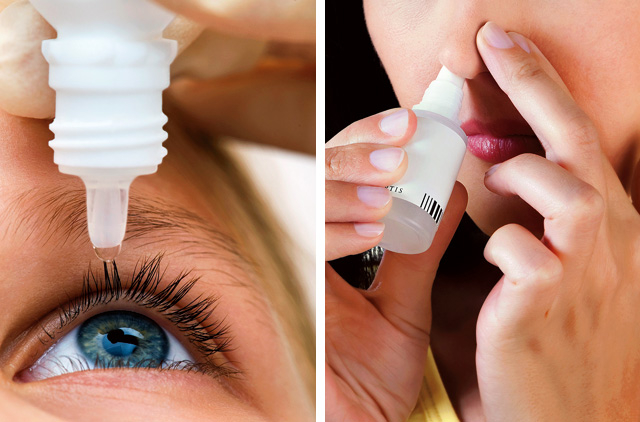If you've been sneezing or coughing a lot lately and are wondering what brought it on, you're probably a victim of a seasonal allergy - along with millions of other people around the world. A recent study conducted by Takeda pharmaceuticals, Allergies in the Middle East (AIME), reveals that not only is the prevalence of nasal allergies increasing in the region, but their impact on people's lives can be severe.
According to Dr Hussain Abdul Rahman, director of medical affairs and head of ENT at Dubai Hospital, "The spread of allergic rhinitis is increasing across most of the world, and especially in the UAE, as a result of environmental pollution."
As anyone who suffers from allergies will tell you, an allergy attack can be far more annoying than merely a niggling cough or a sneezing bout. Allergy patients have been found to have a diminished quality of life - with everything from sleep and mood, to performance at work or school being affected. "Allergies lower productivity by as much as 40 to 60 per cent, reduce concentration at school and on average account for four out of ten absences," says Usamah Hadi, clinical professor at the American University of Beirut Medical Centre.
What causes allergies?
Although there are various types of seasonal allergies, nasal allergies are the most common. These are an inflammation of the mucous membranes that are along the nasal passages. In the UAE, allergic rhinitis - also known as hay fever - seasonal allergic conjunctivitis, and allergic asthma are the most widespread.
While it isn't possible to pinpoint the exact causes for allergies, doctors believe it may be due to pollution, exposure to chemical agents and pesticides and animal or pet dander. Other triggers that can worsen allergies include perfumes, dust mites, mould spores and, most importantly for this region, micro-organisms living in air-conditioning vents. Outdoors, the main triggers for allergies are pollen and dust - another key factor in this region, where we regularly experience sandstorms.
Common symptoms of a nasal allergy include a runny nose; reduced sense of smell; nasal and throat itching; red and tearing eyes; coughing; headaches and sneezing. Anyone can develop an allergy, but those with a family history, children and the elderly are more susceptible.
Why now?
Weather changes tend to trigger allergies, for a variety of reasons. For example, high winds result in an increase in the carrying and distribution of various pollens and moulds that can trigger allergic reactions; rain can increase the amount of mould spores; and a sudden spike in summer heat can dry out or irritate nasal passages, also triggering allergic reactions and asthma attacks.
"Air pollution, smog and temperature inversions severely affect those with allergies and asthma," adds Dr Mazin Rasool Aljabiri, general physician at The Dubai Mall Medical Centre.
"Most allergy symptoms worsen with higher humidity, which also promotes the growth of mould spores."
Apart from the obvious discomfort factor, the effects of suffering from an allergy can cause social embarrassment, and affect day-to-day life by negatively impacting work and academic performance, and reducing involvement in outdoor activities. The AIME survey showed that office productivity is reduced by as much as 27 per cent due to allergy attacks.
Plus, medications used to treat allergies can have negative side effects that have an impact on the activity of the patient, as they can cause drowsiness, and also affect their mood and vitality.
"Nasal allergy treatments include allergy drops taken orally or put under the tongue, or allergy shots that reduce your sensitivity to specific allergens, nasal sprays and antihistamines," says Professor Hadi. "Steroid sprays are also very effective in treating allergic inflammation in the nose."
Interestingly, while 49 per cent of allergy sufferers say they cannot tolerate the discomfort without medication, and the symptoms interfere with their everyday activities and overall quality of life, nearly half of nasal spray users reported that their current treatment wasn't always effective. According to Dr Hussain, "There is a need for better communication between physician and patient to enable an individual to experience better symptom control in order to resume a more productive life." So, the next time you feel sniffly, and it refuses to go away, don't just self-medicate - going to the doctor may be worth your while.
Prevention is better than cure
Nasal steroid sprays, which are anti-inflammatory, are effective when used about two weeks before the onset of the allergy season as a preventive measure and then used daily throughout the season. You could also opt for steroids administered orally or as an injection, to target the whole body.
UAE’s top 3 allergy attackers
1. Hay fever (allergic rhinitis)
Symptoms: The main symptom is sneezing, especially after you wake up in the morning, and it can occur one to two minutes after you breathe in an allergen. Most people will also have a runny nose and, if a sinus infection develops, the phlegm thickens, says Dr Al Sadaka, ENT specialist, Al Noor Hospital, Dubai. Other symptoms include watery eyes, breathing problems as well as an itchy nose, throat and ears.
Causes: This is a condition that can occur after frequent contact with pollen from plants, says Dr Al Sadaka. Other types of allergens that cause allergic rhinitis include mould, dust mites and animal dander. Polluted air can irritate your nose and lungs and increase the chances of an allergic reaction. According to Dr Al Sadaka, around 60 per cent of the UAE's population suffer from allergic rhinitis due to poor ventilation in most houses, and high humidity in summer.
Treat with: Over-the-counter medications such as nasal sprays are usually good for relieving symptoms. Prevent by: Using an air purifier to keep your home allergen-free, and try to stay indoors when pollen count in the air is at its highest.
2. Seasonal allergic conjunctivitis
Symptoms: This condition is quite similar to allergic rhinitis, with the main difference being that the eyes are affected as well. Common symptoms include redness, burning and itchy eyes, aside from mucous discharge, runny nose, sneezing and breathing problems.
Causes: It usually occurs during spring and summer, and the main trigger is grass and ragweed pollen. Other causes are dust mites and cosmetic powders. High humidity in summer can cause this condition in many people.
Treat with: Oral antihistamines and topical treatments such as antihistamine eye drops, as well as steroid and decongestant eye drops are helpful, says Dr Mazin Rasool Aljabiri. Remember to avoid rubbing your eyes to soothe itching, as that can worsen it - use cold compresses instead.
Prevent by: Keeping your home and car windows closed during peak pollen-release hours, usually early mornings and evenings. If you are prone to attacks, it is advisable to take a vaccinating allergy shot beforehand.
3. Allergic asthma
Symptoms: According to Dr Aljabiri, symptoms include persistent coughing (with the cough getting worse at night or in the morning), wheezing due to bronchial spasm and shortness of breath.
Causes: Allergic asthma can be triggered by mould spores, pollen and dust. Allergic asthma can also be caused by exposure to cold air. When an asthmatic person inhales the allergens, they cause the passages in the airways of the lungs to become inflamed and swollen, resulting in coughing and wheezing, says Dr Aljabiri.
Treat with: Asthma attacks and symptoms may vary for each person. Generally, try to avoid exposure triggers and use inhalers, which dilate the wind pipe to allow air to go to the lungs. For instant relief, antihistamine medications that are either inhaled or taken in pill or syrup form are effective. In case of a severe attack, an injection or hospital admission may be necessary. A short course of steroids can also help reduce the inflammation of the wind pipe.
Prevent by: Covering your mattress and pillows in allergic casings. Try to avoid or reduce coming into contact with pets and cigarette smoke.













